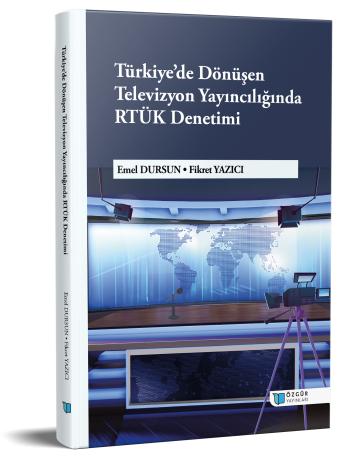
Türkiye’de Dönüşen Televizyon Yayıncılığında RTÜK Denetimi
İndir
Özet
Türkiye’de yayıncılık alanında 1964 yılında 359 Sayılı Kanun ile başlayan denetimler 2954 Sayılı TRT Kanunu ile devlet tekelinde devam etmiştir. Özel televizyonların kuruluşu ile beraber 1994 yılında 3984 Sayılı Radyo ve Televizyonların Kuruluş ve Yayınları Hakkında Kanun kabul edilmiş ve Radyo Televizyon Üst Kurulu kurulmuştur. Kanunun iletişim alanında yaşanan gelişmeler sonrası yayıncılık alanındaki düzenlemeler ve denetlemeler noktasında yetersiz kalması üzerine 2011 yılında 6112 sayılı Radyo ve Televizyonların Kuruluş ve Yayın Hizmetleri Hakkında Kanun yürürlüğe girmiştir. Hızla gelişen internet teknolojisinin ortaya çıkardığı olumsuzlukları gidermek ve isteğe bağlı yayınları düzenlemek için Kanuna 2018 yılında 29/A maddesi eklenmiştir.
Bu çalışmanın temel amacı; Türkiye’de geleneksel yayıncılıktan dijital yayıncılığa geçiş süreci ile birlikte ortaya çıkan denetim problemlerini ortaya koymaktır. Araştırmanın evrenini RTÜK, Türkiye’de yayın yapan tüm geleneksel televizyon kanal ve dijital yayın platform yöneticileri oluşturmaktadır. Amaçlı örneklem yöntemi kullanılarak belirlenen örneklemde ise, 2023 yılı temmuz ayı reyting sıralaması dikkate alınmıştır. Bu doğrultuda geleneksel televizyon kanal, dijital yayın platform ve RTÜK yöneticileri olmak üzere toplam 11 yönetici ile yarı yapılandırılmış görüşme yapılmıştır. Bu görüşmeler MAXQDA Analytical Pro 2022 veri analiz programında kodlanarak analiz edilmiştir. Analiz sonucunda RTÜK’e yönelik olumlu/olumsuz eleştiriler ön plana çıkmıştır. RTÜK’e dair teknolojik gelişmeler karşısında hızlı aksiyon alan, iş birliğine ve eğitime önem veren bir kurum olması gibi olumlu eleştiriler yapılmıştır. Ayrıca şikâyet üzerine harekete geçmesi ve geleneksel televizyonlarda daha sıkı, dijital yayın platformlarında daha esnek denetimler yapması, toplumsal hassasiyetlere duyarsız kalması, reklam sürelerinin yeterince denetlenmemesi gibi problemler tespit edilmiştir. Geleneksel televizyon kanallarının gelecekte de yayıncılık alanında varlıklarını sürdüreceklerine dair bulgular elde edilmiştir.

